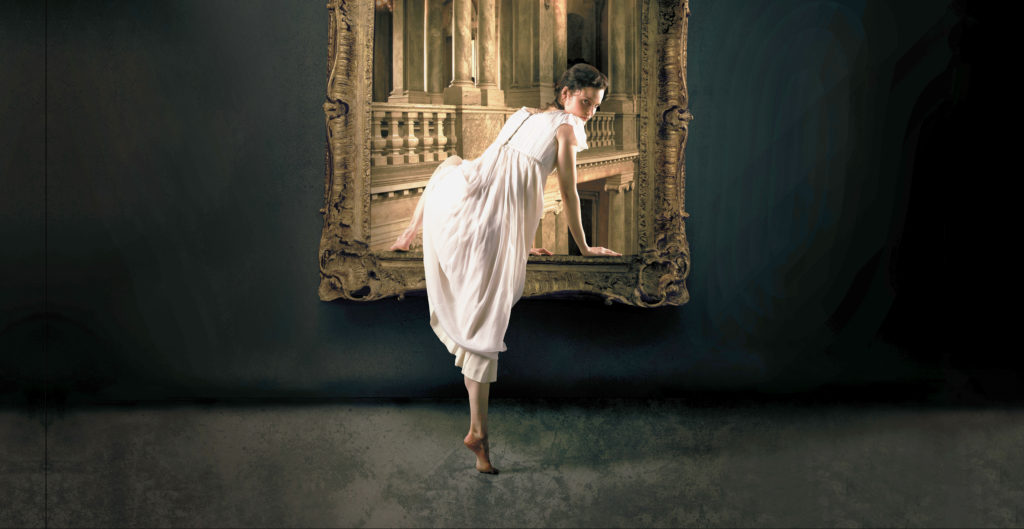Culture
 Photo: Tony Powell
Photo: Tony Powell
Female-Empowered Vanity Fair on the Complexities of Humanity & Transcendence of Gender
March 2, 2019 @ 12:00am
With few exceptions, it’s music to a journalist’s ear when an interviewee says, “You’re asking my favorite question.” But it’s just icing on the cake when your subject is a feminist playwright whose focus is reclaiming female narratives, and you strike a chord that leads to a thoughtful reflection on gender equity in theatre, driving social change through the arts, and breaking down the walls between millennial audiences and the classics.
“I don’t believe that classics deserve to be museum pieces or laid in some beautiful, unmoving grave,” Kate Hamill tells me. “I think they should be able to run around, and we should be able to draw on those altars with crayon and see what they mean to us.”
Hamill’s interpretation of Vanity Fair, on Shakespeare Theatre Company’s Lansburgh Stage through the end of March, is the only female-written stage adaptation of William Makepeace Thackeray’s epic 1600-page novel. When she started toying with the idea of reclaiming the 1840s text for a 2018 audience and was told it couldn’t be done, she accepted the challenge head on.
“I’m a bit of a brat,” she says laughing, “so the minute someone says, ‘You can’t do that,’ I’m like, ‘I’m going to do it.’”
The playwright creates a 12-year portal into the lives of friends Becky Sharp and Amelia Sedley, from when they graduate school at 18 to becoming grown women with children at 30. As the pair navigates their own individual paths in climbing the social ladder within a patriarchal society, Hamill tears down the archetypes of good girl versus bad girl and shows audiences that neither woman is perfect nor particularly condemnable. In fact, women are just human beings like everyone else.
“It’s imaginative and a spectacle, but rooted in truth so you’re not left with just a show,” actress Rebekah Brockman, who plays Becky, says of Hamill’s work. “There’s a pulse behind it and human beings behind it.”
Brockman says there’s a gradual grounding of reality that happens over the course of Becky and Amelia’s friendship as the two experience major milestones together, and credits Hamill with giving the characters more depth.
“You can’t be too quick to judge someone because there’s a reason people make bad decisions. There’s a reason people act the way they do.”
Brockman and Maribel Martinez, who plays Amelia, wax philosophical on the topic across the table from me, finishing each other’s sentences as eloquent phrases pour out of them.
“There’s more to be found in humanity,” Martinez says.
“More complexity,” Brockman continues.
The actresses are elated to be working together on a Hamill play, a feeling intensified by the fact that Shakespeare Theatre’s production is truly a feminist work. The director, Jessica Stone, rounds out the powerhouse female talent at the helm of Vanity Fair.
“I do think it’s really heartening that places like Shakespeare Theatre, which is dedicated largely to classical work, is producing so much work directed by women and made by women,” Hamill says.
Brockman and Martinez share the playwright’s vision for shaping their characters to be more multidimensional and creating a storyline that encourages empathy rather than judgment from the audience.
“I wanted to create a play which challenges you over and over again to challenge your own judgment, because I think when you judge these women it says more about you than it does about them,” Hamill says. “It’s really important to bring that story to DC.”
She hopes that by shifting the narrative to focus on how the women’s bond strengthens over time, audiences will see how Becky and Amelia are able to inch toward defeating the patriarchal system they live within. The playwright is also eager to do away with gender constructs onstage; many of her works promote gender fluidity.
“I’m interested in not only breaking down arbitrary gender roles, but also in creating more interesting work for female artists – I’m always happy to see a woman in a man’s role,” she says with a chuckle. “When you’re an actress, it’s nice to be asked to stretch in that way.”
Hamill played Becky in the original production in New York, giving her unique insight into how she envisions the story unfolding onstage. The current leads are in lockstep with the playwright, describing theatre as an agent for change. Martinez and Brockman say the gender switches in the production highlight the theme of fluidity in companionship, in all relationships even, that we all experience when the curtain closes and we return to reality.
The topic that seems to bond these three artists more than any other we cover in what are truly meaningful, fascinating conversations to me as a woman and lover of the arts is female empowerment in theatre; giving women a seat at the table in leadership roles is what will ultimately make change. Hamill notes that though there are statistically more women than men in theatre school, fast-forward 20 years and of those former students, significantly more men are offered lead roles and directorial opportunities.
“I’m not saying every female story filtered through a male gaze is a bad thing, but it’s a problem when that is the only kind of story we’re getting,” she says.
All three women feel the tides are changing, and they’re encouraged and excited. Though the hill is not an easy climb, the top is in sight and it’s women like them who will get us there.
“All of the different voices that the world has to give,” Martinez says with an infectious optimism in her voice, “we need them in higher positions so that it trickles down and we get all the exciting things that theatre can be.”
Catch Martinez and Brockman in Hamill’s Vanity Fair on the Shakespeare Theatre Company’s Lansburgh Theatre stage now through Sunday, March 31. Tickets are $49-$135 and can be purchased at www.shakespearetheatre.org. Learn more about the playwright at www.kate-hamill.com.
Shakespeare Theatre Company’s Lansburgh Theatre: 450 7th St. NW, DC; 202-547-1122; www.shakespearetheatre.org








